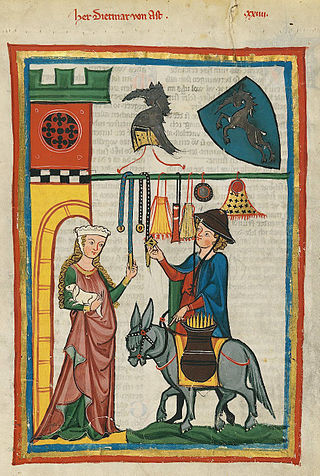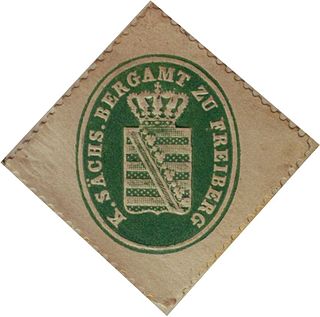
The Bergordnung were the mining regulations or law enacted in order to exercise the royal mining rights or Bergregal in central Europe in medieval times.

The Bergordnung were the mining regulations or law enacted in order to exercise the royal mining rights or Bergregal in central Europe in medieval times.

Konstantin Josef Jireček was an Austro-Hungarian Czech historian, politician, diplomat, and Slavist. He was the founder of Bohemian Balkanology and Byzantine studies, and wrote extensively on Bulgarian and Serbian history. Jireček was also a minister in the government of the Principality of Bulgaria for a couple of years.

Mining law is the branch of law relating to the legal requirements affecting minerals and mining. Mining law covers several basic topics, including the ownership of the mineral resource and who can work them. Mining is also affected by various regulations regarding the health and safety of miners, as well as the environmental impact of mining.

Dietmar von Aist was a Minnesinger from a baronial family in the Duchy of Austria, whose work is representative of the lyric poetry in the Danube region.

David Kaufmann was a Jewish-Austrian scholar born at Kojetín, Moravia. From 1861 to 1867 he attended the gymnasium at Kroměříž, Moravia, where he studied the Bible and Talmud with Jacob Brüll, rabbi of Kojetín, and with the latter's son Nehemiah.

Benedikte Naubert was a German writer who anonymously published more than 50 historical novels and is considered a pioneer of the genre in the 1780s. Naubert wrote under the pseudonyms Verfasser des Walther von Montbarry, Verfasser der Alme, Verfasserin des Walther von Montbarry, and Fontanges. Today she is largely unknown, even in Germany.
Victor Emil Gardthausen was a German ancient historian, palaeographer, librarian, and Professor from Leipzig University. He was author and co-author of some books; editor of ancient texts.

Joseph Ennemoser was a South Tyrolean physician and stubborn late proponent of Franz Mesmer's theories of animal magnetism. He became known to English readers through Mary Howitt's translation of his History of Magic.

Julius Alwin Franz Georg Andreas Ritter von Schlosser was an Austrian art historian and an important member of the Vienna School of Art History. According to Ernst Gombrich, he was "One of the most distinguished personalities of art history".

Kurt Flasch is a German philosopher, who works mainly as a historian of medieval thought and of late antiquity. Flasch was professor at the Ruhr University Bochum. He was / is a member of several German and international Academies. In 2000, he was awarded the Sigmund Freud Prize by the Deutsche Akademie für Sprache und Dichtung.

The Saxon Mining Office is the executive authority for mining rights in the German state of Saxony. It is also responsible for all non-metallic mineral resources on the terrain of the former East Germany.

The Bergregal was the historic right of ownership of untapped mineral resources in parts of German-speaking Europe; ownership of the Bergregal meant entitlement to the rights and royalties from mining. Historically, it was one of those privileges that constituted the original sovereign rights of the king.
The right of coinage in the Holy Roman Empire was one of the so-called regalia. It consisted of the right to issue regulations governing the production and use of coins. It covered the specification of currency, the right to mint and the right to use coins and the profit from minting. It is variously referred to in English sources as the "right of coinage", "coinage regality", "regality of coinage", "minting privileges" and "coinage prerogative".

The lokator was a medieval sub-contractor, who was responsible to a territorial lord or landlord for the clearing, survey and apportionment of land that was to be settled. In addition, he hired settlers for this purpose, provided their means of subsistence during the transitional period and made materiel and implements available, such as seed, draught animals, iron ploughs, etc. He thus played a key role during the establishment of new towns and villages, as well as the clearing of uncultivated land during the phase of internal colonisation (Binnenkolonisation) in North German and the German Ostsiedlung and participated in its success.

Otto Piper (1841–1921) was a German architectural historian who, with August von Cohausen (1812–1896), is regarded as one of the two founders of scientific research into castles.
Friedrich Wilhelm Karl, Ritter von Hegel was a German historian and son of the philosopher Georg Wilhelm Friedrich Hegel. During his lifetime he was a well-known and well-reputed historian who received many awards and honours, because he was one of the major urban historians during the second half of the 19th century.

The County of Moers was a historical princely territory on the left bank of the Lower Rhine that included the towns of Moers and Krefeld as well as the surrounding villages and regions.

Paul Diepgen was a German gynecologist and historian of medicine.
Johannes Sylvius Egranus was a German theologian, humanist, reformer and a friend of Martin Luther.

Friedrich Rühs (1781-1820) was a German historian of Scandinavian and Germanic history. At the time of the Liberation War he wrote xenophobic anti-French and anti-Jewish nationalist texts, and is seen as a forerunner of volkish anti-semitism.
Friedrich Gustav Schilling was a German musicologist, editor and lexicographer.